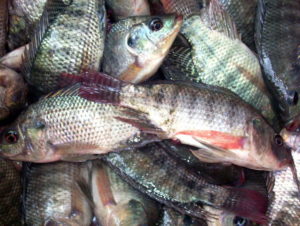Ghana government directs removal of Asian genetically improved fish from Volta Lake
 The Government, Wednesday, directed the authorities responsible for fisheries to urgently remove and cleanup all traces of the Asian Genetically Improved Farm Tilapia (GIFT) and its derivatives from fish farms along the Volta Lake.
The Government, Wednesday, directed the authorities responsible for fisheries to urgently remove and cleanup all traces of the Asian Genetically Improved Farm Tilapia (GIFT) and its derivatives from fish farms along the Volta Lake.
Professor Kwabena Frimpong-Boateng, Minister of Environment Science, Technology and Innovation (MESTI), at a meeting with farmers to discuss the recent mass death of fish at Asutsuare, stated: “We are determined to weed out those farms that have flouted our laws and are culturing and distributing unapproved strains of tilapia, in order to safeguard the aquaculture industry”.
He explained that though the cause had been attributed to Streptococcus agalactiae, the situation was compounded by the illegal introduction and proliferation of the Asian GIFT strain of tilapia on many farms within the Volta River system.
“Reports by independent genetic analysis to the Ministry indicated that the illegal introduction of the Asian GIFT strain had occurred alongside the emergence of a new strain of Streptococcus bacteria with genetic signatures similar to the Chinese strain of Streptococcus agalactiae,” he said.
The meeting was to share with them the findings of the investigations into the problem of recent high fish mortality in fish farms on the Volta Lake and the Lower Volta.
“We observed that a combination of factors, including the proliferation of bacteria, have contributed to the deaths of fish so far recorded,” he explained.
This strain of bacteria, Prof. Frimpong-Boateng said, was resistant to the vaccines used against the locally occurring strain of streptococcus agalactiae and that the resilience of the Akosombo strain to bacterial infection was compromised by the illegal crossing of the local strain with foreign ones.
“We note that this is the most critical factor accounting for the massive death of fish on the farms in recent months,” he added.
The Minister explained that laboratory observations by the Environmental Protection Agency, alongside tests carried out by the Fisheries Commission and the Ghana Standards Authority did not find evidence to support the initial suspicion by the farmers of poisoning from the discharge of deleterious materials into the Lake or the Lower Volta.
In the medium-term, Prof Frimpong Boateng said, Government agencies and would work together to ensure that from March 2019, only approved and certified hatcheries would supply fingerlings and broodstocks to farmers.
He asked them to observe improved sanitation in the cropping environment and comply with regulatory requirements to ensure high water quality.
He also advised them to limit their stocking densities to the carrying capacity appropriate for the respective strata of the lake or the Lower Volta system to be able to cope with periodic low oxygen tension.
They could also deploy air blowers and aerators to improve dissolved oxygen.
The Minister announced that the Environmental Protection Agency had initiated investigations to identify all farms that had the Asian GIFT or the Akosombo strain introgressed with Asian strains in their custody or offering it for sale to farms.
He urged all the farmers to support the Governments’ efforts by volunteering leads to those farms who were keeping the Asian GIFT or the Akosombo Strain with introgressed GIFT genes.
The farmers applauded the steps being taken by the Government to address the situation, saying it was important to stop the situation, which was causing a lot of harm at the farms.
They, however, asked the Government to strengthen its enforcement role and take punitive measures against any farmer who would flout the regulations, especially the farm that introduced that strain into the lake.
In October the Fujian Farm recorded 18,000 tonnes of tilapia deaths at its farm, leading to investigations and its closure.
Other cases of mortality have since been recorded on other farms.
Source: GNA
